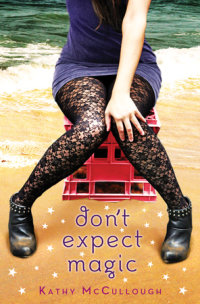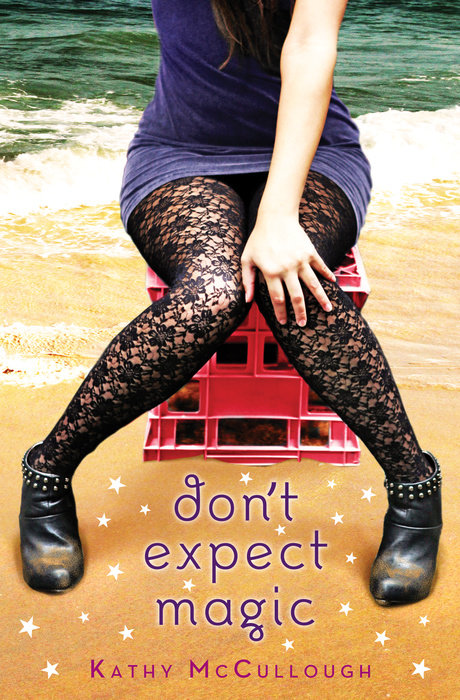Don't Expect Magic
Delaney Collins doesn't believe in fairy tales. And why should she? Her mom is dead, her best friend is across the country, and she's stuck in California with "Dr. Hank," her famous life-coach father—a man she barely knows. Happily ever after? Yeah, right.
Then Dr. Hank tells her an outrageous secret: he's a fairy godmother—an f.g.—and he can prove it. And by the way? The f.g. gene is hereditary. Meaning there's a good chance that New Jersey tough girl Delaney is someone's fairy godmother.
But what happens when a fairy godmother needs a wish of her own?
An Excerpt fromDon't Expect Magic
Chapter One
Of course I’m cursed with the most uncomfortable seat on the plane. The cushion’s deflated in this bizarrely lopsided way, like somebody with one butt cheek exponentially bigger than the other sat there before me and crushed it. My overhead light’s burned out and the bald guy in front of me dropped his diet Dr Pepper, splashing sticky soda all over my backpack, which I had wedged under the seat.
It shouldn’t be called Murphy’s Law, it should be called Delaney Collins’s Law, because I’m living it. If something can go wrong, it does, and anything bad just gets worse. I don’t even want to be on this plane. But I have no choice.
For now, anyway.
I turn up the volume on my iPod and scroll to the heavy metal playlist Mom downloaded for me: all of her favorite songs for scrambling the brain and numbing the mind. We used to blast it whenever we were angry or depressed or frustrated with the world--which was a lot toward the end. But tonight my brain cells are staying stubbornly unscrambled and unnumbed.
I stare out at the itch-black night, but the grimy little window just reflects my face back at me. The dim cabin lighting casts weird shadows that make me look like a girl out of a manga book: long black pen strokes for hair, eyes circled in dark ink, face flat and expressionless.
Maybe it’s a true reflection. Maybe everything that’s happened has drained the human part out of me and left just a two-dimensional drawing.
I wish.
I’ve tried sketching. I’ve been working on a new design: thigh-highs with spikes on the backs of the heels, chains around the ankles and slashes up and down the sides like they’ve been hacked at with a switchblade. I call them Shredded Death. The idea’s finished in my head but only halfway done on the page, because my mind keeps getting yanked back to . . .
“I like your boots.”
I turn away from the window. Next to me in the middle seat is a little girl around four years old. She’s in a pink fairy princess outfit, complete with plastic tiara and a magic wand made out of a chopstick with a glitter-covered construction-paper star taped to the end of it. Her overhead light hits her like a spotlight so that she practically shimmers. On her other side, her mother snores softly in the shadows.
I could ignore her. That usually works, but kids and old people can be a problem. There’s something abnormal about them--they can’t take a hint.
What the hell, I think. Maybe having a pointless conversation with a delusional preschooler will provide the distraction I’m desperate for. It’s worth a try. I remove one earbud but keep the other one in, so I’m still getting a regular flow of screeching guitar--an emotional IV.
“Huh?” I say. It’s important to start aloof, in case I have to cut it off abruptly. I don’t want to lead anyone on, make them think I might actually be friendly.
“I like your boots,” the girl says again, and points her lame wand toward my feet. I’m wearing a design I created back in less bleak times. I got the originals from the consignment shop I worked at after school. The boots were too big around the calf, so I slit the leather in the back and then attached brass snaps, with matching ones across the front.
I remember, faintly, the rush of joy I felt painting on the blue and yellow swirls. Mom had wanted me to make her a matching pair. But I never got around to it.
“Thanks.”
“Do you like my shoes?” The girl swings out her tiny legs, displaying a pair of sparkly pink flip-flops. Hideous.
I shrug.
“They’re magic,” she says.
“Uh-huh.” Time to turn up the frost. This conversation isn’t going anywhere good. I grab the earbud from my lap.
“Can you read my book to me?” The girl holds up the picture book resting on her tray table. She does that sad wide-eyed thing little kids do to get their way. It never works with me. “Pleeease?” She thrusts the book in my face. Annoying.
Even more annoying, I hear myself say, “Sure, whatever.”
I sigh. Stuck.
I open the book to its first cheery page and predict that this is not going to be a story that sweeps me away. Sure enough, it’s one of those sappy girl-lost-in-the-woods, helped-by-the-friendly-talking-animals, magic-spells-broken, evil-ogre-defeated stories. With the traditional but irritating and most dishonest final sentence ever created in the history of literature:
“And she lived happily ever after.”
I do my best to inject sarcasm and disapproval into my voice as I read these last words, because even if I’m not going to get anything out of the experience, at least I’ll have passed on some wisdom to the younger generation. But the girl just smiles the satisfied smile of one who is hearing the same beloved story for the billionth time. Clearly, I’m going to have to spell it out for her.
“It doesn’t really work like that, you know,” I tell her. “Things don’t end happily.”
“Yes, they do.”
I shrug and hand the book back to her. “You’ll learn,” I say. I tried. Someday she’ll look back on this conversation and remember she was warned.
“It wouldn’t be in the book if it wasn’t true,” she says firmly, like she’s teaching me some lesson.
I don’t answer. Some people would rather live in a fairy tale.

